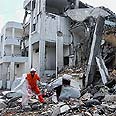
Mideast future at stake in north
Israeli weakness will threaten regional stability and scuttle chances of peace with moderate Arabs
The fighting in Lebanon gives the international community a chance to differentiate between the Israel's fight with Lebanon and that with the Palestinians. For Israel, it opens up the possibility that we can accomplish our goals in Gaza quickly and bring the fighting there to a quick finish. And it gives the Lebanese the opportunity to exert their sovereignty over the south of their country and to free themselves from the clutches of Iran and Syria.
The Palestinians, too, must now decide in whose hands they wish to leave the key to their future.
Int'l community must back Israel
Even if France and Russia condemned Israel for its disproportional response, the Europeans and the United Nations – more than the United States – must continue to grant legitimacy to Israel, and support the use of the IDF in self-defense.
International hesitation or reluctance to do this will amount to withdrawing its recognition that Israel had complied with Security Council Resolution 425 by pulling our troops out of Lebanon.
Furthermore, it would grant recognition to the fact that Lebanon has failed to exert its sovereignty in the south of the country, and grant a stamp of approval to the fact that Lebanon has failed to comply with Security Council Resolution 1559, as well as legitimacy to organizations such as Hizbullah and Hamas to continue their fight from that area.
More than that, the international assurances offered to Israel during every negotiation session with Syria or the Palestinians would lose their meaning and weight with regard to the risks Israel will be willing to take upon itself in future.
Releasing Syria from any responsibility for a process that has Syrian fingerprints all over it (same thing for Iran) could force Israel to try to exact a higher price from Syria than a harmless IDF flyover of Bashar al-Assad's palace in Damascus, in a way that could broaden the conflict into a regional one.
Iran, Syria run the show
The orders coming from Damascus make a joke out of Lebanese aspirations, with UN backing, to take control for their future, even if Assad's army has physically left the country.
And even more serious: Through Hizbullah, Iran and Syria have successfully set the regional agenda and prevented processes that could bring an end to the Israeli-Palestinian conflict.
Chance for change
Israel must make the northern front its main focus, because at the moment it is only there that there is a real chance for long-term change.
Israel must seize the opportunity and weaken the connection between Hamas and Hizbullah, using mediation to bring about calm in Gaza, in the form of a package deal to include the release of Gilad Shalit, a future release of Palestinian prisoners (as agreed by Prime Minister Olmert and Mahmoud Abbas before the current crisis), a total cessation of Qassam rocket fire, and a halt to targeted assassinations of all Palestinians abiding by the cease-fire.
Focusing on the northern front will allow Israel to avoid failing on a front that Israel cannot complete with its hands in its pockets. The result of that would be a strong tremor throughout the Arab world with regard to future relations with Israel.
Supporting Arab moderates
Destroying Hizbuallah's military presence along the international border will push Nasrallah's finger off the trigger of the gun he keeps pointed at Israel and at Lebanon, but even more important – it will prevent those Arabs in favor of compromise with Israel – namely Egypt and Jordan – from apologizing for their peace treaties.
The violent lesson Nasrallah forced on a Lebanese government that wants to rebuild the country must teach that Lebanon cannot demand Israel respect the sovereignty of a region that Lebanon itself has refused to assume sovereignty over, either militarily or civilly.
Stronger international support for the Lebanese government could push it to deploy forces to the south, in order to remove the need for Israel to return.
Palestinian lessons
The Palestinians should also learn this lesson, both with regard to their own desire for sovereignty – which Damascus has taken out of the hands of Gaza and Ramallah – and with regard to staging anti-Israel operations from territories transferred to their control.
The strategic importance of Operation Just Reward is far greater than previous operations such as the 1996 Grapes of Wrath. It is even greater than Operation Summer Rains down in Gaza.
This is a fight for the future of the peace and compromise process between Israel and moderate elements in the Arab world. The success of Nasrallah and Ahmadinejad, who call for Israel's destruction at any price, will call into question the region's stability. That stability rests on Israel's military superiority and Arab peace agreements with Israel.
It will bring about a return to the type of violence we used to have. The international community and Israel must choose actions that will prevent this before this operation becomes a full-fledged war. Even if the moderates win such a war, it will take years to repair all the damage.
Brig. Gen. (res.) Shaul Arieli is a member of the National Council for Peace and Security










